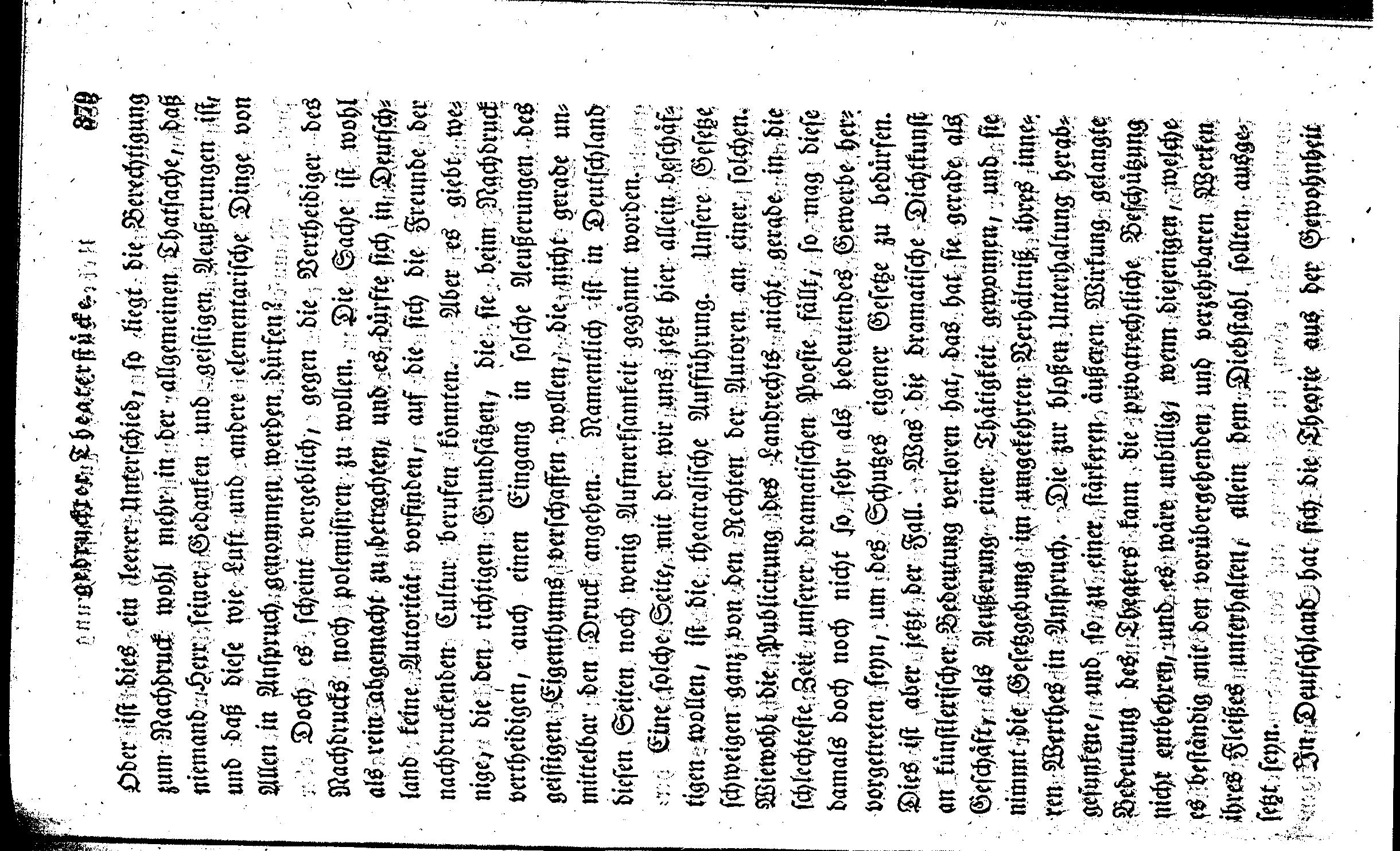PRIMARY SOURCES
ON COPYRIGHT
(1450-1900)
Browse Documents By...
Original Language...
Documents For...
Browse Commentaries By...
Browse Referred Persons By...
Gans: On the right to perform published stage plays, Berlin (1832)
Source: Private Collection
Citation:
Gans: On the right to perform published stage plays, Berlin (1832), Primary Sources on Copyright (1450-1900), eds L. Bently & M. Kretschmer, www.copyrighthistory.org
Back | Record | Images | Commentaries: [1]
Translation only | Transcription only | Show all | Bundled images as pdf
379 of published stage plays
Or, if this is an irrelevant distinction, does the justification
for reprinting, then, lie rather in the general fact that
nobody is the proprietor of his thoughts and intellectual utterances,
and that, like air and other elementary substances, these can
rightfully be claimed by everyone?
However, it seems pointless to seek to debate any further
with the defenders of reprinting. The matter is surely
to be regarded as having been convincingly settled, and it will
scarcely be possible to find in Germany a figure of authority who
might be invoked by the friends of the reprinting culture. And yet
few are the people who are willing to apply the correct principles
which they defend in the question of reprinting to such expressions
of intellectual property, too, which are not directly concerned
with printing. In Germany, especially, these aspects have so far
received very little attention.
One such aspect, which we intend to consider on its own here,
is that of stage performances. Our laws say nothing whatsoever
about the authors' rights to such performances. Although the
promulgation of the Statute Book occurred during a period which
was by no means amongst the worst, as far as German writing for
the stage is concerned, the latter nevertheless had then not yet
manifested itself quite as a sufficiently significant profession
as to require the protection of special laws. This is, however,
the case now. What our dramatic poetry has lost in terms of
artistic significance, it has gained precisely in business terms,
as the manifestation of a professional occupation, and it lays
claim to the legislature in inverse proportion to its intrinsic
value. The theatre, reduced as it is to mere entertainment but
thereby capable of a more powerful outward effect, cannot do
without the protection of civil laws, and it would be unjust if
those who regularly maintain it with the transient and expendable
fruits of their diligence were alone to be exposed to theft.
In Germany the following theory has emerged as a result of custom:
No Transcription available.
Source: Private Collection
Citation:
Gans: On the right to perform published stage plays, Berlin (1832), Primary Sources on Copyright (1450-1900), eds L. Bently & M. Kretschmer, www.copyrighthistory.org
Back | Record | Images | Commentaries: [1]
Translation only | Transcription only | Show all | Bundled images as pdf
379 of published stage plays
Or, if this is an irrelevant distinction, does the justification
for reprinting, then, lie rather in the general fact that
nobody is the proprietor of his thoughts and intellectual utterances,
and that, like air and other elementary substances, these can
rightfully be claimed by everyone?
However, it seems pointless to seek to debate any further
with the defenders of reprinting. The matter is surely
to be regarded as having been convincingly settled, and it will
scarcely be possible to find in Germany a figure of authority who
might be invoked by the friends of the reprinting culture. And yet
few are the people who are willing to apply the correct principles
which they defend in the question of reprinting to such expressions
of intellectual property, too, which are not directly concerned
with printing. In Germany, especially, these aspects have so far
received very little attention.
One such aspect, which we intend to consider on its own here,
is that of stage performances. Our laws say nothing whatsoever
about the authors' rights to such performances. Although the
promulgation of the Statute Book occurred during a period which
was by no means amongst the worst, as far as German writing for
the stage is concerned, the latter nevertheless had then not yet
manifested itself quite as a sufficiently significant profession
as to require the protection of special laws. This is, however,
the case now. What our dramatic poetry has lost in terms of
artistic significance, it has gained precisely in business terms,
as the manifestation of a professional occupation, and it lays
claim to the legislature in inverse proportion to its intrinsic
value. The theatre, reduced as it is to mere entertainment but
thereby capable of a more powerful outward effect, cannot do
without the protection of civil laws, and it would be unjust if
those who regularly maintain it with the transient and expendable
fruits of their diligence were alone to be exposed to theft.
In Germany the following theory has emerged as a result of custom:
No Transcription available.












